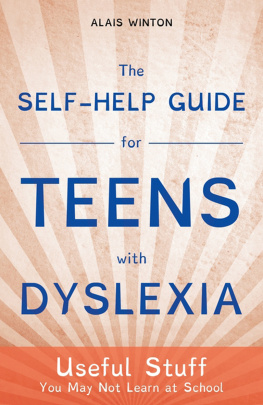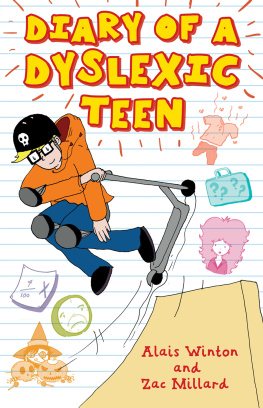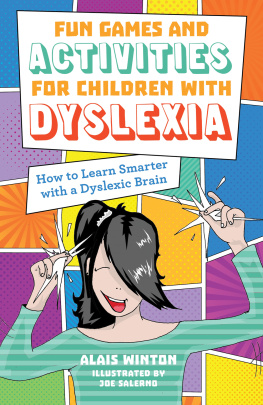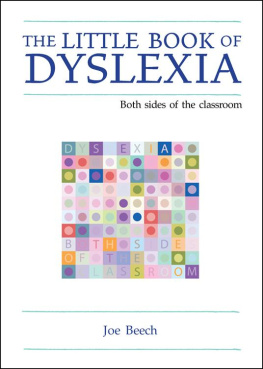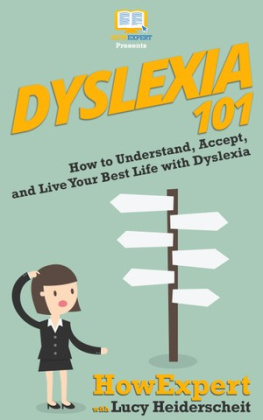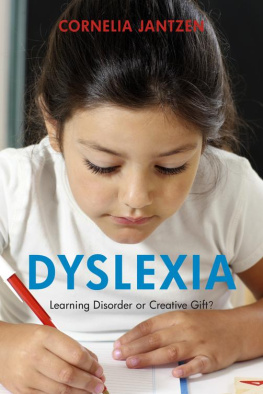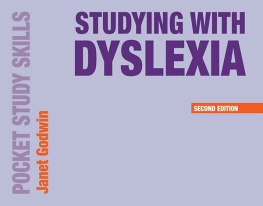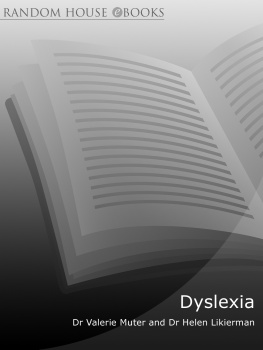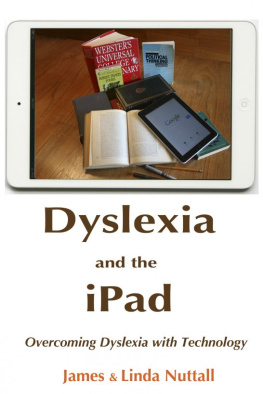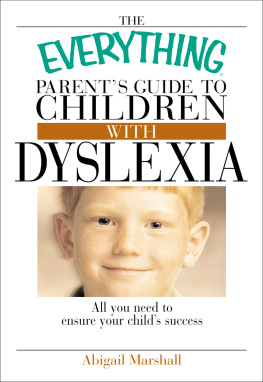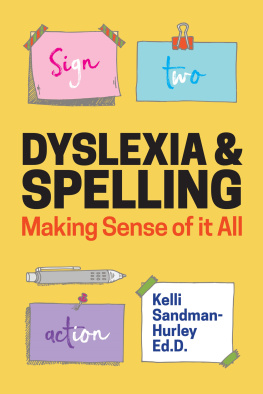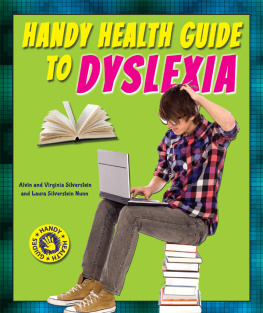
The Self-Help Guide for Teens with Dyslexia
of related interest
Can I tell you about Dyslexia?
A guide for friends, family and professionals
Alan M. Hultquist
Illustrated by Bill Tulp
ISBN 978 1 84905 952 7
eISBN 978 0 85700 810 7
Dyslexia and Alternative Therapies
Maria Chivers
ISBN 978 1 84310 378 3
eISBN 978 1 84642 547 9
ALAIS WINTON
The
SELF-HELP GUIDE
for
TEENS
with
DYSLEXIA
Useful Stuff
You May Not Learn at School

Jessica Kingsley Publishers
London and Philadelphia
First published in 2015
by Jessica Kingsley Publishers
73 Collier Street
London N1 9BE, UK
and
400 Market Street, Suite 400
Philadelphia, PA 19106, USA
www.jkp.com
Copyright Alais Winton 2015
All rights reserved. No part of this publication may be reproduced in any material form (including photocopying or storing it in any medium by electronic means and whether or not transiently or incidentally to some other use of this publication) without the written permission of the copyright owner except in accordance with the provisions of the Copyright, Designs and Patents Act 1988 or under the terms of a licence issued by the Copyright Licensing Agency Ltd, Saffron House, 610 Kirby Street, London EC1N 8TS. Applications for the copyright owners written permission to reproduce any part of this publication should be addressed to the publisher.
Warning: The doing of an unauthorised act in relation to a copyright work may result in both a civil claim for damages and criminal prosecution.
Library of Congress Cataloging in Publication Data
Winton, Alais.
The self-help guide for teens with dyslexia : useful stuff you may not learn at school / Alais Winton.
pages cm
Includes bibliographical references.
ISBN 978-1-84905-649-6 (alk. paper)
1. Dyslexic children--Education. 2. Dyslexics--Education. 3. Learning disabled children--Education. 4.
Learning disabled youth--Education. 5. Reading disability. I. Title.
LC4708.P73 2003
371.9--dc23
2014048997
British Library Cataloguing in Publication Data
A CIP catalogue record for this book is available from the British Library
ISBN 978 1 84905 649 6
eISBN 978 1 78450 144 0
For Hannah, who gets me, I am thankful for you every day.
For Gordon, thank you for your love, support, proofreading skills and so much more.
For Zac and Jacob, I know you have faced challenges in learning, but I also know that you will both be amazing at whatever you choose to do.
Acknowledgements
Many thanks to Mia Broomhall for being my elegant and very patient model. Thanks also to the rest of Broomhall family for their support and encouragement throughout. To Gordon, thanks for proofing my work. Thank you to Mandy and family for their huge support and contributions to the work. Many thanks to Sarah Hoss, for her advice and suggestions, and her unshakeable and continued belief in this idea, even when it was just in my head. Thanks to Hannah Rackham, for being you. Thanks to Jacob Broomhall and Zac Millard for inspiring me to do this. Finally, thanks to everyone else who has helped and supported me in the writing of this book.
Contents
Chapter 1
Welcome to My World
Id like to start by saying hello to you, whoever you are, reader, and tell you a bit about my story and why I wanted to write this book.
I am dyslexic. You might be dyslexic too or know someone close to you who is, and you probably know what it means to you, but this is what it means for me: I struggle with reading (words often move about on the page, when Im tired they fall off the end of sentences like lemmings jumping off a cliff and sometimes I dont understand the meaning of what Ive read); I often make mistakes in spelling and cant see the mistakes when I look over my work; I lose things and myself easily (even with a satnav!); and I forget things. All of this makes learning harder for me than it would be for someone who doesnt have to cope with this every single day!
On the plus side, I think in three-dimensional images. This means that I can direct a play, make a sculpture or choreograph a group dance entirely in my head. I am creative, intelligent and interested in people if you happen to have dyslexia, its vital that you are able to remember the things you are good at when times are tough.
I have spent my life learning. From GCSEs, to a degree and postgraduate certificate in education and, along the way, I have also done courses in belly dancing, car maintenance, basic psychology, beauty therapy, anatomy and physiology and Swedish body massage.
As a college tutor I always promote learning it can be an amazing experience and can sometimes open unexpected doors but as a dyslexic there have been times, even as an adult, when the act of trying to learn has reduced me to tears or feelings of anger and frustration. Contained within this book is a collection of ideas and techniques that I have used to help me learn. Without these strategies, I would not have completed my degree in Theatre Studies and English, and subsequent learning would also have been much harder to achieve.
I cannot offer you a cure if you are dyslexic like me then you will always see things differently but what I can offer are some solutions to common problems for dyslexics who want to learn. I hope that the suggestions in this book are useful, but most of all I hope that you are able to do whatever you want to do in life and that these tools help you to succeed in the learning you need along the way.
Some of the most successful and inventive people in history and today have found education difficult. Vive le square peg! We should be making the hole a different shape, not the peg! So, the next time your brain is saying I dont get it, that doesnt mean that you wont ever get it, it just means that it isnt being explained in a way that works for you .
Chapter 2
Im Sure Ive Forgotten Something!
If, like me, you forget where youve put things, what youre supposed to be doing and where exactly youre meant to be doing it, then this chapter is for you.
There is nothing quite as infuriating as trying to remember something that you just cant seem to bring to mind, no matter how hard you try. If the thing you want to remember is for an exam, then this becomes not only frustrating, but stressful as well, and is likely to affect your result. You might also end up mentally kicking yourself when you realise that you knew the answer but just couldnt remember it; sadly exams dont usually have an ask me later box to tick.
In order to talk about ways to improve your memory, I first need to explain a bit about memory and how it works in the human brain. You probably already know that there are two different types of memory long-term and short-term, for example:
long-term I remember falling in the pond in school, when I was seven, and going through a phase of drawing and painting purple mountains
short-term I remember what I had for breakfast this morning (this is not always the case!).
Learning something while we are actually doing it has to, by its nature, involve short-term memory. Unfortunately, this is the type that I, and most dyslexics, have difficulty with. I can remember the smell of a wood that I havent been to for at least 20 years, but I sometimes find it difficult to remember something I was told five minutes ago. Part of this is because sensory memory is stronger, but most college courses wont be taught through the medium of smell (aromatherapy may be a rare exception!).
Next page
